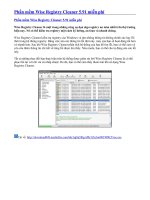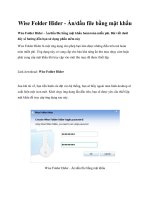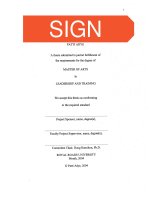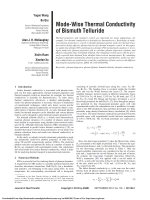Wordly wise 6
Bạn đang xem bản rút gọn của tài liệu. Xem và tải ngay bản đầy đủ của tài liệu tại đây (26.87 MB, 225 trang )
WORDLYWISE
3OOO@THIRD EDITI
Kenneth Hodkinson I Sandra Adams
School Specialty, Inc.
Cambridgε and Toronto
Editorial Project Manager: Kate Moltz
Senior Editor: 찌1ill Tripp
Editor: Rachel Smitn
Senior Designer: Deboran Rodman
Cover Design: M icnelle Monnkern
Illustration Credits:
Lessons 2, 5, 7, 10, 11, 14, 20: Q2AMedia.
Photograph Credits: Lesson 1: Xavier Marchant/Fotoli a; Lesson 3: Mike Thomas/Fotoli a; Lesson 4:
Masterfìle; Lesson 6: RK/Masterfìle; Lesson 8: Charvex; Lesson 9: Darrin Klimek/Getty Images/
Thinkstock; Lesson 10: ]upiterimages, Brand X Pictures/Thinkstock; Lesson 12: Photos.com/Getty Images/
Thinkstock; Lesson 13: Goodshootπhinkstock; Lesson 15: Ablestock.com/Getty Images/Thinkstock;
Lesson 16: Library of Congress Prints and Pnotographs Division Washington, D.C. 20540 USA;
Lesson 17: NOANIFE/URI; Lesson 18: Daria Chikurova/Fotoli a; Lesson 19: iStockphoto/Thinkstock.
@ 2012 by Educators Publishing Service. AlI rights reserved. No part of this book may be reproduced
or l1 tilized in any form or by any electronic or mechanical means, incl l1ding photocopying, without
permission in writing from the publisher.
Printed in Benton Harbor, MI, in ]l1ly 2015
ISBN 978-0-8388-7606-0
12 PPG 18 17 16 15
Lesson 1 Lesson 13 128
Lady Li berty 7 The Ship of the Desert 135
Lesson 2 11 Lesson 14 139
The Mother of the The Travels of Marco Polo 145
Civil Rights Movement 18 Lesson 15 149
Lesson 3 22 Our Brightest Star 156
Land of Contrasts 28 Lesson 16 160
Lesson 4 32 The "Unsinkable" η tomc 166
A Different Way to Fly 38
Review for Lessons 13- 16 170
Review for Lessons 1- 4 42
Lesson 5 Lesson 17 171
43 Graveyard of the Deep 177
A Born Artist 49 Lesson 18 181
Lesson 6 53 Journey to the 50viet Union 187
The Story of Silk 60 Lesson 19 191
Lesson 7 64 The Great Age of Castles 198
Home, Home on the Range 70 Lesson 20 202
Lesson 8 74 The Pied Piper of Hamelin 208
Sacagawea's Great Adventure 80
Review for Lessons 17-20 212
Review for Lessons 5-8 84
Pronunciation Key 216
Lesson 9 85
Water, Water, Everywhere 91
Lesson 10 94
Fun and Games 101
Lesson 11 105
Elizabeth Blackwell, M.D. 111
Lesson 12 115
The Trojan Horse 121
Review for Lessons 9- 12 125
Welcome to Wordly 뻐~se3000@
You've been learning words since you were a tiny baby. At first, you learned
them only by hearing other people talk. Now that you are a reader, you
have another way to learn words.
Obviously, it's important to know what words mean, but lots of times, we
think we can get away without knowing some of them as we read. This
could cause a problem. Say you are reading the directions for a new game.
You know most of the words in the sentence you're reading. Then you stop
for a word you don't recognize:
Pleose do not touch the blegmy or your score wil/ be lost.
You ask yourself,“What is a blegmy?" At first you think,“Well, it’s only one
word:' But then you think,“ What is it that I'm not supposed to touch?" AII of
a sudden, knowing what that one word means is important!
Clearly, the more words you know, the better your understanding of
everything you read. Wordly Wise 3000 will help you learn a lot of words,
but it can't teach you 011 the words you'lI ever need. It can, however, help
guide your learning of new words on your own.
How Do You Learn What Words Mean?
There are two main ways you learn what words mean: directly and
indirectly.
You have to learn some words directly. You may study them for a class, look
them up in a dictionary or glossary, or ask someone what they mean . You
also learn word meanings indirectly by hearing and reading the words. In
fact, the more you listen and read , the more words you’Illearn. Reading
books, magazines, and online can help build your vocabulary.
At school, you learn a lot of words directly. If you're using this book, you
are learning words directly. You are reading the words, learning what
they mean, and studying them. Then you are practicing them as you do
the activities. Finally, you might even use them in your own writing or
conversations. There is an old saying: “ Use a word three times and it's
yours:' Three times might not be enough, of course, but the idea is right.
The more you practice using a word, the better you understand it.
IV
What Is "School Language’?
5choollanguage-or school words-are the words you find in the books
you read , from novels to textbooks, and on tests. You read them online
as you look up information. Your teacher uses these words to explain
an important concept about math or reading. 50me have to do with a
particular topic, such as the building of the Great Pyramid in Egypt. Others
are words for tasks you are being asked to do, such as summarize. These
words are different from the kinds ofwords you use when you’re hanging
out with your friends or talking casually with your family. That’s whyyou
often need to study these words directly.
Wordly Wise 3000 is designed to teach you some of the words you need to
do well in school and on tests-and later on in your jobs. It will also help
you learn how to learn more words. Remember, there is no single thing
that will help you understand what you read as much as knowing word
meanings wil l.
How 00 You Figure Out Word Meanings?
What should you do when you come to a word and you think you don't
know what it means?
Saylt
First, say it to yourself. Maybe once you do this, it will sound like a word
you do know. 50metimes you know a word in your head without knowing
what it looks like in print. 50 if you match up what you know and what you
read-you have the word!
Use Context
If this doesn’t work, take the next step: look at the context of the word-
the other words and sentences around it. 50metimes these can give you a
clue to the word’s meaning. Here's an example:
Mκ Huerta had great respect for his opponent.
Wordly Wise 3000. Book 6 V
Say that you don’t know what opponent means. Does Mr. Huerta have
respect for his teacher? His mother? Then you read on:
The two players sat across from each other in the warm room. The
chessboard was between them. 80th looked as if they were concentrating
veryhard.
Now you see that Mr. Huerta is taking part in a chess game. You know that
in a chess game, one person plays another. So his opponent must be the
person he is playing against. You reread the sentence using that meaning.
Yes, that works.ln this sentence, opponent means "someone you play
against, or compete with:'
Use Word Parts
If the context doesn’t help, look at the parts of the word. Does it have any
prefixes you know? How about suffixes? Or roots? These can help you
figure out what it means. Look at this sentence:
Shania had the misfortune to hurt her arm right before the
sWlm meet.
If you don't know the meaning of misfortune, try looking at parts of the
word. You might know that fortune means “ luclζ, Maybe mis- is a prefix.
You could look it up, or maybe you remember its meaning from studying
prefixes in school. The prefix mis- means a few different things, but one of
them is “ bad:’ You try it out and reread the sentence using that meaning.
It would certainly be bad luck, or a misfortune, to hurt your arm before a
sWlm meet.
Look It Up
If saying the word or using context and word parts don't work, you can
look it up in a dictionary-either a book or online reference-or a glossary.
Nobody knows the meaning of every word, but good readers know how to
use these strategies to figure out words they don't know. Get into the habit
of using them as you read, and you may be surprised at how automatic it
becomes!
VI
How Well Do You Knowa Word?
It’s important to know many words and to keep on learning more. But it's
also important to know them wel l. In fact, some experts say that there are
four levels of knowing a word:
1.1 never saw/heard it before.
2. I've heard/seen it, but 1don't know what it means.
3.1 think it has something to do with ...
4.1 know it.용
Just because you can read a word and have memorized its definition, it
doesn’t mean that you know that word wel l. You want to know it so well
that you know when to use it and when to use another word instead. One
way to help deepen your knowledge of a word is to use a graphic organizer
like the one below that tells about the word portion.
Concept of Definition Map
What is this?
a part or share
of the whole
Examples Non-examples
section, share, whole,
servmg something complete
portion
What is it like?
a part of something larger
may be one person’ sshare
If you can fill in all the parts of this graphic organizer, you are well on your
way to really knowing the word portion.
*Dale, E., & O'Rourke, J. (1986). Vocabulary Building. Columbus, OH:Zaner-Bloser.
Wordly Wise 3000. Book 6 VII
口
- Free Website: WordlyWise3000.com
Did you know you can access Wordly Wise 3000 online?
Go to www.WordlyWise3000.com and you will find:
( 뻐rd Lists for a빠 lesson5 )
The Word Lists allow you to read the words and their definitions and
listen to how they are pronounced.
The Word Li sts can also be downloaded onto your MP3 player. You
can download them and study them wherever you are-home, on
the bus, in study period-a great use 0fyour time.
[ A Quick Check question for every word )
You can check your understanding of each word right away.
That helps you know which words you need to spend more time
studying.
( Games “ r every book )
Games are grouped to use as reviews, just as you would use the
Review Puzzles in your book. Use them to practice and have fun
with the words you’ve learned.
Good luck in your study of words. It takes some work, but it will
pay off in the end.
VIII
For more practice and games, 9。
to www.WordlyWise3000.com.
Lesson
률휩짧톨 5tudy the definitions of the words. Then do the exercises that follow.
affection n. A fond or tender feeling.
a fek’ shan
Hugging is one way to show affection.
affectionate 。이. Gentle and loving.
My cousin took my hand and gave it an affectionate squeeze.
appeal ι 1. To make an earnest request; to ask.
a pel ’ Three students appealed for more time to finish the work.
2. To be of interest to; to be attractive to.
This very funny movie will appeal to children of all ages.
n. 1. An earnest request for help.
The letter contained an appeal for money to provide shelters for the homeless.
2. The power to attract or be of interest.
Neither the liver and onions nor the meatloaf had much appeal.
clasp ι To grasp or hold tightly.
klasp The dancers clasped hands and circled the maypole.
n. 1. A strong grasp or hold.
The nurse gently removed the doll from the toddler’5 clasp.
2. Something, such as a hook or fastener, that holds two parts together.
빼때 빼빼 The necklace has a clasp in the shape of a snake biting its tai l.
0에. Easilyor plainly seen.
His great height made him conspicuous in any crowd.
contribute ι 1. To give along with others who are giving.
kan trib’ yõõt 1contributed a spinach salad to the potluck supper.
2. To have a part in bringing about.
Exercise contributes greatly to good health.
contribution n. (kän tri byoo 'shan) That which is given.
The museum sent a thank-you note for the fifty-dollar contribution.
contributor n. (kan trib ’ ya tar) One who gives.
Contributors to the new theater received free tickets for opening night.
@
declare ι To make known; to state openly. m이-
·。
de klâr’ "1 will not seek reelection;’ she declared. 。
z。
declaration n. (dek la rã ’ shan) A public statement. 。녁 I
The declaration read by the mayor stated that November was bicycle 「1-
safety month. p녁nm
Wordly Wise 3000 • Book 6
eloquent a이. Skilled at speaking or writing; having the power to move people.
el ' a kwant Anne Frank’s eloquent diary often moves readers to tears.
eloquence n. Skill at speaking or writing; the power to move people.
Dr. Martin Luther King’s eloquence made him the obvious choice to lead the
1960s Civil Rights Movement.
exhibit ι To show in public.
eg zib ’ it Local artists exhibited their paintings at the library.
n. An item or collection of items in a public show.
The most interesting exhibit in the museum was the dinosaur skeleton.
exhibition n. (ek sa bish' an) A large-scale public show.
Tickets for the exhibition of early automobiles go on sale next week.
ferry n. A boat that carries people and goods back and forth across a stretch
fe r' ë of water.
The ferry will go out of service when the new bridge opens.
ι To move people or goods by boat across a stretch of water.
The boat owner who ferried us across the lake would not accept any payment.
immigrant n. A person who comes into a country to live there.
im ’ a grant Many Polish immigrants settled in Chicago.
lofty adj. 1. Very tall or high.
lôf’ të Lofty elm trees provided welcome shade on many American streets.
2. Noble in feeling or high in ideals.
Ending world hunger in our lifetime is a lofty goa l.
3. Showing a too-proud or superior attitude.
The lofty way the diner spoke to the waiter made me feel uncomfortable.
pedestal n. A base or support on which something stands.
ped ' as tal After communism collapsed in Russia, hardly a statue of Stalin was left
standing on its pedestal.
persecute ι To treat cruelly or harshly because of political, religious, or other differences.
pttr’ sa kyõδt The Kurds of northern Iraq were persecuted by the Iraqi rulers for wanting
their own state.
persecution n. (pur sa kyoo ' shan) The state or condition of being persecuted.
Hitler's persecution of the Jews led to the murder of millions of
innocent people.
poverty n. The state of being poor.
päv ' ar të The food stamp program was started to help feed American families living
in poverty.
2 Lesson 1
unveil ι 1. To remove a covering from.
un vãl' The president of the American Red Cross unveiled the portrait of its founder,
Clara Barton.
2. To make known or reveal for the first time.
The police chief will unveil a plan to reduce street crime at today’s meeting.
픔랬웰뭘획I
Choose two phrases to form a sentence that correctly uses a word from
Word Li st 1. Write each sentence on the line provided.
1. (a) let that person go free. (c) treat that person badly.
(b) To clasp someone is to (d) To persecute someone is to
2. (a) If something is lofty, (c) it is hidden from view.
(b) If something has appeal, (d) it has the power to attract.
3. (a) To exhibit something is to (c) understand it fully.
(b) To unveil something is to (d) reveal it for the first time.
4. (a) Poverty is (c) a condition of poor health.
(b) Eloquence is (d) the state of being poor.
5. (a) To speak in an (디 is to show a too-proud attitude.
affectionate manner (d) is to show extreme shyness.
(b) To speak in a lofty manner
@
mm
6. (a) a lever operated by the foot. (디 a public showing. -。-
。
(b) An exhibit is (d) A pedestal is 。z녁
。ζ
「1-
〔〉
녁머
Wordly Wise 3000. Book 6
7. (a) entry into a country to live there. (c) skill at speaking or writing.
(b) Eloquence is (d) Affection is
8. (a) understand it. (c) To clasp something is to
(b) hold it tightly. (d) To contribute to something is to
9. (a) ask that person for help. (디 To appeal to someone is to
(b) To ferry someone is to (d) give comfort to that person.
10. (a) A pedestal is (c) a person traveling on foot.
(b) A contribution is (d) something that is given.
affection Improve each of the fo"owing sentences by crossing out the bold phrase and
appeal replacing it with a word (or a form of the word) from Word Li st 1.
clasp
consplcuoUS 1. My parents were people who came to live in this country from Mexico.
contribute
declare 2. The boat that carries people across the river leaves every hour on
eloquent the hour.
exhibit
ferry 3. The sundial, together with the base on which it stands, costs two hundred
immigrant
lofty dollars.
pedestal
persecute 4. There was a burst of applause when the artist removed the covering from
poverty her painting.
unveil
5. The president’5 public statement that the factory would not be closing was
4 Lesson 1 welcome news to the townspeople.
6. A heavy dessert would not be of interest to me after that big turkey dinner.
7. The generosity of the audience was one of the things that led to the
success of the auction.
8. The powerful, moving words of Abraham Li ncoln's “Gettysburg Address"
made a deep impression on me.
9. Their unusual way of dressing makes them easy to notice in a crowd.
10. I have nothing but fond and tender feelings for you al l.
t똘끊괜월끊텐
Circle the letter or letters of each correct answer. A question may have more
than one correct answer.
1. Which of the following could be unveiled?
(a) a statue (c) a painting
(b) a cloud (d) a plan
2. Which of the following can be declared?
(a) a winner (c) one's love
(b) one’5 children (d) a holiday
3. Which of the following can be contributed?
(a) money 디 clothing
(b) time (d) space
4. Which of the following could be ferried?
(a) hopes (c) people
(b) fears (d) cars
5. For which ofthe following might someone be subjected to persecution?
(a) driving too fast (c) breaking into someone's home
(b) having different beliefs (d) belonging to a different race
Wordly Wise 3000 • Book 6 @
mm
-
·。
。
。z
녁
。
깅ζ
〔
-
”m(
〉
→
5
6. Which ofthe following would be conspicuous?
(a) a lighthouse on a cliff (c) a billboard by the roadside
(b) a pebble on the beach (d) a purple house
7. Which ofthe following could be exhibited?
(a) pottery (c) uncertainty
(b) days (d) coins
8. Which of the following are always true of immigrants?
(a) They speak more than one 디 They plan to live in a new country.
language.
(b) They are poor. (d) They have left their own country.
Synonyms are words that have the same or similar meanings.
Circle the two synonyms in each group of four words.
affection 1. tall eloquent hidden lofty
appeal 2. understand contribute declare state
clasp 3. show return exhibition appeal
consplcuoUS 4. eloquent movlng consplcuous tired
contribute 5. contribute request return appeal
declare 6. fastener base poverty pedestal
eloquent 7. affectionate fond consplcuous sad
exhibit 8. persecution anger grasp clasp
ferry 9. ferry poverty need desire
ímmígrant 10. clasp immlgrant supply fastener
lofty
pedestal
persecute
poverty
unveil
6 Lesson 1
Read the passage. Then answer the questions that follow it. @
m
Lady Liberty m
·。-
The Statue of Li berty is a symbol of freedom to people all over 。
the world. Since 1886 it has welcomed immigrants who sail into 。z
New York harbor to begin a new life in the United States. Like many 녁
of them, Lady Li berty, as the statue is affectionately known, had to 。
overcome some difficulties before reaching these shores. 깅ζ
「
The statue was a gift from the people of France to the people -
of the United States. It was given in honor of the friendship between the two 〔
countries and the one-hundredth anniversary of the American Revolution. 녁〉m
But before the statue could be put in place, the people of the United States
had to provide a pedestal for it at a cost of one hundred thousand dollars. 7
That turned out to be no easy task. A fund -raising drive was launched and ran
into immediate difficulties. Newspapers across the United States ridiculed the
effort. They argued that since the French we re sending over the statue, they
should be the ones to pay the extra costs involved for the base.
Despite this opposition, the effort to raise the money continued. A forty-
foot-high section ofthe right arm, with the hand clasping the torch of liberty,
was sent to the United States. It was displayed at the 1876 Philadelphia
exhibition marking the one-hundredth bi rthday of the Un ited States. Visitors
paid fifty cents to climb onto the balcony surrounding the torch. Many other
fund -raising events were also held. But even after several years, contributions
fell far short of the total needed. The future of the entire pr이 ect seemed in
doubt. Not until a newspaper appeal promised to print donors' names was
the necessary money raised.
With the success of the project assu red, the rest of the statue was finally
shipped from France.lt arrived in pieces packed in over two hundred wooden
crates. The work of assembling it proceeded without further delay. A public
holiday was declared on October 28, 1886, when the Statue of Li berty was
at last unveiled. It was one of the largest gatherings ever in New York City.
The island where the statue stands is called Li berty Island. It is reached bya
short ferry ride from lower Manhattan. At just over 305 feet, the statue was
the tallest structure in New York City. Though it is now dwarfed by the lofty
skyscrapers of Manhattan, at the time it was the most conspicuous landmark
in the city.
Wordly Wise 3000 • Book 6
In the 1880s, people seeking a better life were flooding into the United
States.They arrived at the rate of one million a year. Many of them came
from Russia and Eastern Europe; they had been cruelly persecuted by their
governments and were fleeing to safety. Others were escaping the poverty of
their native lands in search of a more prosperous life in America.
The museum at the base of the statue contains a bronze tablet placed
there in 1903. On it is a poem written twenty years earlier by Emma Lazarus,
whose own family had fled Russia. The poem has captured the imagination of
the American people and has become forever associated with the Statue of
Li berty. It ends with these eloquent lines:
Give me your tired, your poor,
Your huddled masses yearning to breathe free,
The wretched refuse of your teeming shore;
Send these, the homeless, tempest-tost to me,
llift my lamp beside the golden door!
’ Answer each of the following questions in the form of a sentence. If a
question does not contain a vocabulary word from the lesson's word list,
use one in your answer. Use each word only once.
1. What is the meaning of lofty as it is used in the passage?
affection 2. What finally caused Americans to contribute the necessary funds ?
appeal 3. What was done with the statue’5 arm in Philadelphia in 1876?
clasp 4. How can you tell that the author has a favorable opinion of Lazarus's poem?
conspicuous 5. What is the meaning of appeal as it is used in the passage?
contribute
declare
eloquent
exhibit
ferry
immigrant
lofty
pedestal
persecute
poverty
unveil
8 Lesson 1
6. Why were so many people able to attend the first showing ofthe statue?
7. What was the hope of people who came to America to escape the poverty of
their homelands?
8. Why did the American people have to raise $1 OO,OOO?
9. How is the torch of liberty supported by the statue?
10. How do visitors reach the Statue of Li berty?
11. What is the meaning of unveil as it is used in the passage?
12. Why do you think the United States has been called a nation of immigrants?
13. Why is the statue not such a conspicuous landmark as it once was?
14. Why would persecuted people want to come to the United States?
@
mm
15. Do you think the people fleeing to the United States for safety in the 1880s felt ·。-。
affection for their governments? Why or why not? 。z
녁。
ζ「1
-〔
녁〉m
Wordly Wise 3000. Book 6 9
• The Latin word for foot is ped, and • An immigrant is a person who
several English words, such as enters a country intending to live
there. An emigrant is a person who
pedal (a lever worked by the foot) leaves one country to settle in
and pedestrian (a person going another.ln the late nineteenth and
on foot), come from it. Since a early twentieth centuries, many
pedestal is a base that stands at people emigrated from Europe
and arrived in the United States as
the foot, or lowest part, of a stat- immigrants.
ue, column, or similar object, you
• Persecute and prosecute are simi-
might think that pedestal comes lar sounding words that are some-
directly from ped. Actually it comes times confused even though they
have quite separate meanings. To
from an Italian phrase, pie di stallo, persecute someone is to make that
person suffer because of political,
which means "a foot (or lowest
part) of a stall:' Since the Italian religious, or other differences. To
word for foot comes from ped, it’s
correct to say that the English word prosecute someone is to bring that
person to trial for criminal acts.
pedestal also comes from it, but in a
roundabout manner.
affection
appeal
clasp
consplcuoUS
contribute
declare
eloquent
exhibit
ferry
immigrant
lofty
pedestal
persecute
poverty
unveil
10 Lesson 1
For more practice and games, 9。
to www.WordlyWise3000.com.
Lesson
-‘ 률밸를뭘l 5tudy the definitions of the words. Then do the exercises that follow.
mns 빠
뻐, ‘ 빼 G예. Showing too much pride in oneself.
You were arrogant to claim that you knew all the answers.
arrogance n. A feeling of too much pride in oneself.
Declaring that you are sure to win is another example of your arrogance.
boycott v. To join others in refusing to deal with a person or group.
boi ' kät Customers plan to boycott that store if it continues to overcharge.
n. The act of boycotting.
빼 J 빼 n 뻐“mi The fans called off their boycott when the teams agreed to lower ticket prices.
내
n. 1. A series of actions intended to accomplish a goal.
〕「 Picking up litter was the first step in the campaign to clean up the
town center.
2. A series of military actions in a particular area.
General Sherman’5 four-month-Iong Atlanta campaign ended with the fall of
that city on September 2, 1864.
ι To take part in actions planned to accomplish a particular goal.
Students who wish to campaign for class office must submit petitions.
댄 mm m 따 n. A formal event held in honor of a special occasion.
--
The bride and groom exchanged rings during the wedding ceremony.
% ’9 때 %
custody n. 1. Control over and responsibility for care.
kus ’ ta dé Following a divorce, each parent may want custody of the children.
2. In the keeping of the police; in jai l.
The new officer took the thief into custody.
degrade ι To bring shame or disgrace upon.
dé grãd ' By Iying to cover up his cheating, Sam degraded himself even more.
degrading a여;. Causing shame or disgrace.
Losing the trophy because one player had taken a bribe was a degrading
expenence.
@
detain ι To stop or hold; to keep from going on. m·。-
m。
dé tãn ' The customs officers detained us while they searched our bags.
。z
→
。
ζ
깅
「-
n〉
m →
Wordly Wise 3000. Book 6 11









